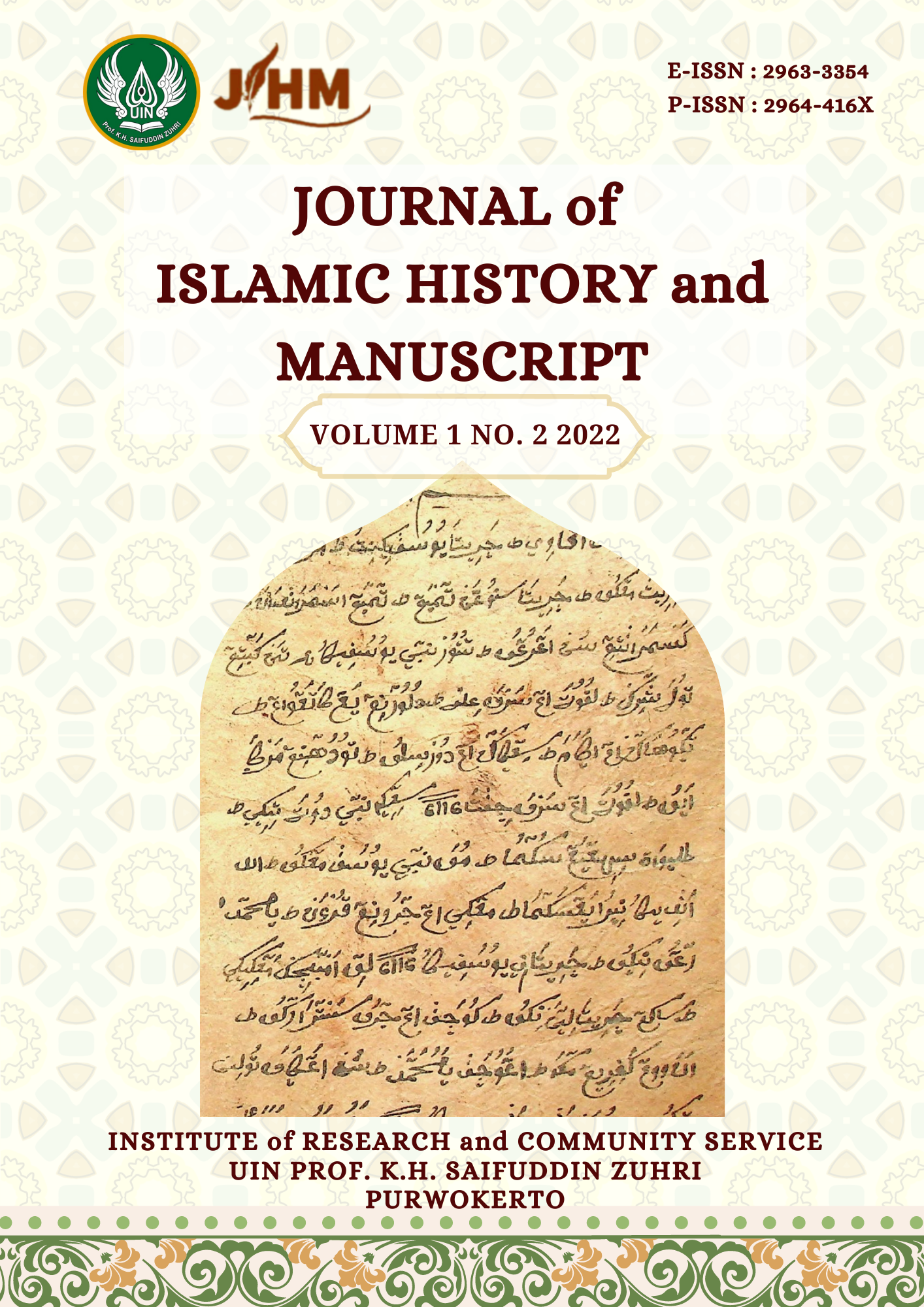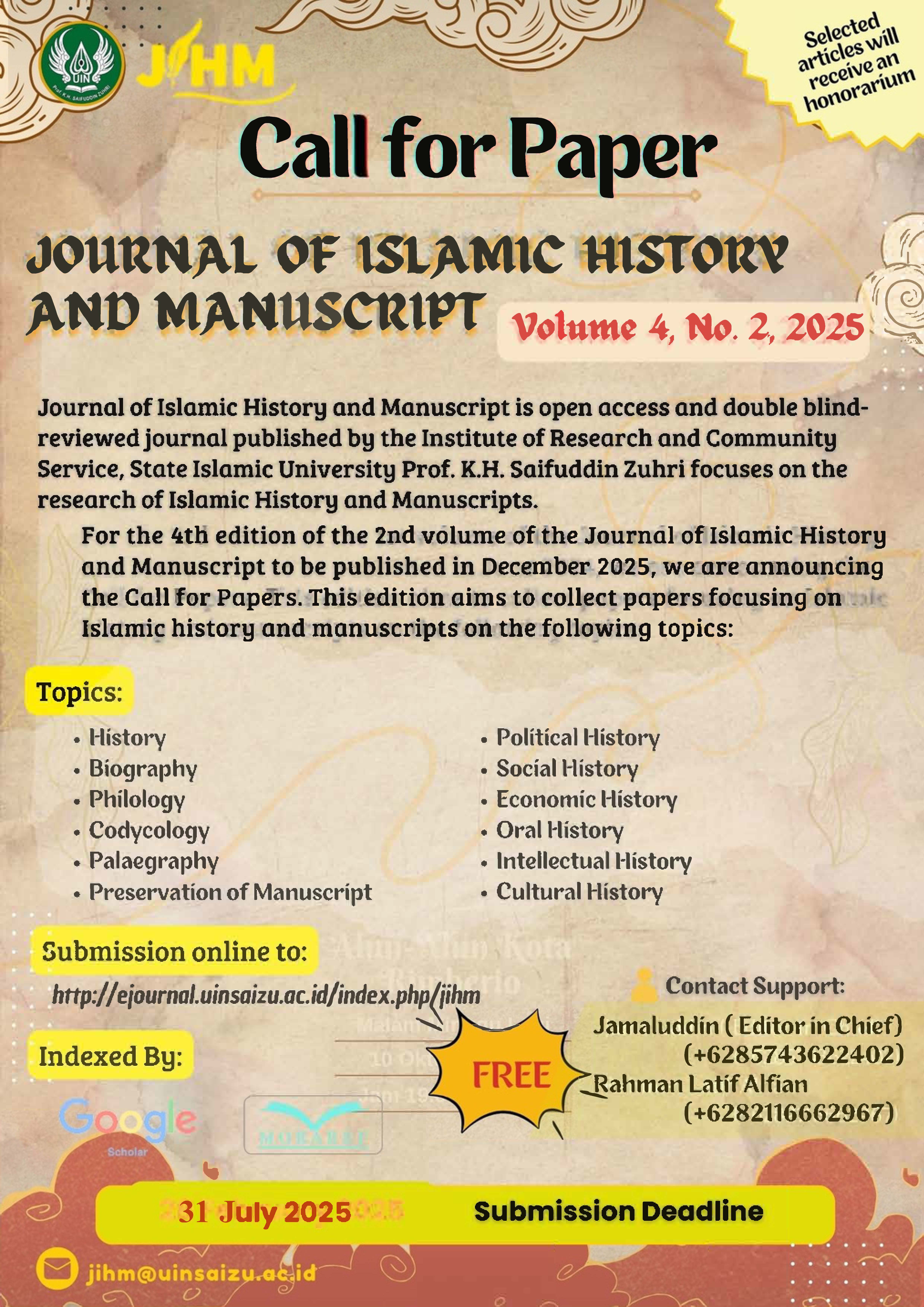Biography of the Mufti Sultanate in West Kalimantan: H. Muhammad Basiuni Imran (1885-1976 AD) and H. Ismail Mundu (1870-1957 AD)
DOI:
https://doi.org/10.24090/jihm.v1i2.6958Keywords:
Mufti of the Sultanate, H. Muhammad Basiuni Imran, H. Ismail MunduAbstract
H. Muhammad Basiuni Imran and H. Ismail Mundu are mufti or charismatic clerics who are popular now in the West Kalimantan area. Both lived contemporaneously, and their work in various scientific, social, and political fields has brought them to a level of popularity that is not only in the Malay Archipelago world but also in the Islamic world. Therefore, it is essential to study their biographies, starting with their family background, education, academic career, environment, and work. The method used is the historical method and comparative research. The results of this study are as follows 1) both mufti comes from religious family backgrounds, as seen from the childhood of H. Muhammad Basiuni Imran studied religion from his father, H. Muhammad Imran, while H. Ismail Mundu studied theology with his uncle, H. Muhammad bin H. Ali; 2) the two mufti used the Middle East as their intellectual space. It was seen that H. Muhammad Basiuni Imran performed the hajj and studied simultaneously in Mecca and Egypt, while H. Ismail Mundu performed the hajj three times and only studied in Mecca; 3) both multitasked with explaining to the public religious issues when H. Muhammad Basiuni Imran, as mufti in the Sultanate of Sambas, wrote Tafsir Tujuh Surah and Ayat as-Siyam as a response to the problems faced by the Malay community. Meanwhile, H. Ismail Mundu held the position of mufti in the Kubu Sultanate, writing Bugis translation of the holy book of the Qur’an as a response problem faced by the Bugis people.References
Effendy, Machrus. (1995). Riwayat Hidup dan Perjuangan Maharaja Imam Sambas. Jakarta: P.T. Dian Kemilau.
Ghozali, Ahmad. (2021). Resepsi Atas Al-Quran dalam Kebudayaan Masyarakat Teluk Pakedai dan Hubungannya Terhadap Penafsiran (Studi Amalan Syaikh Ismail Mundu Mufti Kerajaan Kubu). Jurnal Mafatih: Jurnal Ilmu Al-Qur’an dan Tafsir 1 (1), 1-10.
Haris, Didik M. Nur. (2016). Jaringan Intelektual Islam Kalimantan Barat Abad ke-20: Sebuah Analisis Sejarah. International Conference On Social and Intellectual Transformation of the Contemporary Banjarese 09-11 Agustus 2016, 5.
Haris, Didik M Nur, dan Rahimin Affandi Abd Rahim. (2017). Pemikiran Keagamaan Muhammad Basiuni Imran. al-Banjari: Jurnal Ilmiah Ilmu-Ilmu Keislaman 16 (2), 161–185. https://doi.org/10.18592/al-banjari.v16i2.1464.
Haris, Didik M Nur, dan Rahimin Affandi Abdul Rahim. (2017). Akar Tradisi Politik Sufi Ulama Kalimantan Barat Abad ke-19 dan 20. Ijtimaiyya: Jurnal Pengembangan Masyarakat Islam 10 (1), 39-62. 10.24042/ijpmi.v10i1.2355.
Hasim, Moh. (2013). Karya Ulama dalam Membangun Kedamaian di Kalimantan Barat. Al-Qalam: Jurnal Penelitian Agama dan Sosial Budaya 19 (1), 59-66.
Juniardi, Karel. (2016). Dakwah Islam H. Ismail Mundu di Kalimantan Barat Tahun 1907-1957. Candrasangkala: Jurnal Pendidikan dan Sejarah 2 (2), 11-23.
Kurniawan, Syamsul, dan Erwin Mahrus. (2011). Jejak Pemikiran Tokoh Pendidikan Islam: Ibnu Sina, al-Ghazali, Ibn Khaldun, Muhammad Abduh, Muhammad Iqbal, Hasan al-Banna, Syed Muhammad Naquib al-Attas, K.H. Ahmad Dahlan, K.H. Hasyim Asy’ari, Hamka, Basiuni Imran, Hasan Langgulung, Azyumardi Azra. Edited by Aziz Safa. Yogyakarta: ar-Ruzz Media.
Mohamed, Norahida. (2021). [Muhammad Basiuni Imran: His Role in Propagating The Superiority of Islam in Sambas, West Kalimantan] Muhammad Basiuni Imran: Peranannya dalam Menegakkan Syiar Islam di Sambas, Kalimantan Barat. Jurnal Islam dan Masyarakat Kontemporari 22 (1), 83-97.
Nasrullah, Ahmad M. Sewang, Syamsudduha, dan Nurman Said. (2018). Pembaruan Pemikiran Pendidikan Islam Muhammad Basiuni Imran (1906-1976 M). Jurnal Diskursus Islam 06, (1), 135–155. https://doi.org/10.24252/jdi.v6i1.7056.
Nurmansyah, Ihsan. (2019). Kajian Intertekstualitas Tafsir Ayat as-Siyam Karya Muhammad Basiuni Imran dan Tafsir al-Manar Karya Muhammad Rasyid Rida. al-Bayan: Jurnal Studi Ilmu al-Qur’an dan Tafsir 4 (1), 1–14, doi:10.15575/al-bayan.v4i1.4792.
Nurmansyah, Ihsan. (2021). Tafsir al-Qur’an Bahasa Melayu-Jawi di Kalimantan Barat (Kajian Kodikologi dan Historis-Periodik Naskah Tafsir Tujuh Surah dan Ayat as-Siyam Karya Muhammad Basiuni Imran. Substantia: Jurnal Ilmu-Ilmu Ushuluddin 23 (1), 1–23, doi:10.22373/substantia.v23i1.8719.
Nurmansyah, Ihsan dan Adib Sofia. (2021). Paralel, Transformasi dan Haplologi Tafsir Tujuh Surah Karya Muhammad Basiuni Imran dengan Karya Tafsir Muhammad Rasyid Ridha: Kajian Intertekstualitas. al-Bayan: Jurnal Studi Ilmu al-Qur’an dan Tafsir 6 (2), 66–82, doi.org/10.15575/al-bayan.v6i2.14685.
Nurmansyah, Ihsan dan Luqmanul Hakim Haris. (2022). Penggunaan Ayat-Ayat al-Qur’an dalam Tradisi Salat Robo’-Robo’ di Desa Selat Remis, Teluk Pakedai, Kubu Raya, Kalimantan Barat: Analisis Sosiologi Pengetahuan. Tanzil: Jurnal Studi al-Qur’an 5 (1), 29-40.
Parwanto, Wendi. (2019). Struktur Epistemologi Tafsīr Sūrah Tūjuh Karya Muhammad Basiuni Imran, Sambas, Kalimantan Barat.” Tesis, UIN Sunan Kalijaga Yogyakarta.
Parwanto, Wendi. (2022). Muhammad Basiuni Imran: Tokoh Legendaris Islam, Sambas, Kalimantan Barat Abad 20 M. al-Fanar: Jurnal Ilmu Al-Qur’an dan Tafsir 5 (1), 57-70.
Risa. (2015). Perkembangan Islam di Kesultanan Sambas: Kajian Atas Lembaga Keislaman Pada Masa Pemerintahan Sultan Muhammad Syafiuddin II 1866-1922 M. Yogyakarta: Penerbit Ombak.
Riyadhi, Baidhillah. (2012). Haji Ismail Mundu, Ulama Legendaris dari Kerajaan Kubu. Kubu Raya: Dinas Kebudayaan Pariwisata Pemuda dan Olahraga Kabupaten Kubu Raya.
Sajad, Abdulah, Abdullah Thaha, Acep Arifudin, Adi Prayitno, Ahmad Sanusi, Ahmad Muawwam, Ahmadie Thaha. (2016). Ensiklopedi Pemuka Agama Nusantara. Jakarta: Puslitbang Lektur dan Khazanah Keagamaan Badan Litbang dan Diklat Kementerian Agama RI.
Salim, H. Moh. Haitami, Hermansyah, H. Yapandi, Erwin, Eka Hendry, Zulkifli, dan Luqman. (2011). Sejarah Kesultanan Sambas Kalimantan Barat. Puslitbang Lektur dan Khazanah Keagamaan Badan Litbang dan Diklat Kementerian Agama RI.
Sunandar, Duski Ibrahim, dan Nor Huda. (2019). Resonansi Maharaja Imam Muhammad Basiuni Imran (1885-1976) di Sambas. Medina-Te: Jurnal Studi Islam 15, (1), 75–91. https://doi.org/10.19109/medinate.v15i1.3542.
Suprianto, Bibi. (2021). Sejarah Habib Husein al-Qadrie dalam Menyebarkan Ajaran Islam di Daerah Pedalaman Kalimantan Barat. Juspi: Jurnal Sejarah Peradaban Islam, 4 (2), 112.
Syarif. (2018). Corak Pemikiran Islam Borneo (Studi Pemikiran Tokoh Muslim Kalimantan Barat Tahun 1990-2017). At-Turats: Jurnal Pemikiran Pendidikan Islam 12 (1), 15-31.
Downloads
Published
How to Cite
Issue
Section
License
Copyright (c) 2022 Ihsan Nurmansyah, Sherli Kurnia Oktaviana

This work is licensed under a Creative Commons Attribution 4.0 International License.
Authors who publish in this journal agree to the following terms:
- Authors retain copyright and grant the journal right of first publication with the work simultaneously licensed under a Creative Commons Attribution 4.0 International License. that allows others to share the work with an acknowledgment of the work's authorship and initial publication in this journal.
- Authors can enter into separate, additional contractual arrangements for the non-exclusive distribution of the journal's published version of the work (e.g., post it to an institutional repository or publish it in a book), with an acknowledgment of its initial publication in this journal.
- Authors are permitted and encouraged to post their work online (e.g., in institutional repositories or on their website) before and during the submission process, as it can lead to productive exchanges and earlier and greater citation of published work (See The Effect of Open Access).

















